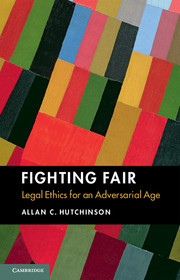8 - Toward a Just Peace
Published online by Cambridge University Press: 05 August 2015
Summary
It seems to follow that, if there are strict conditions and guidelines for only waging just wars and with just means, there must also be attention given to ensuring that hostilities are ended and resolutions reached that are themselves in compliance with a set of just principles. The approval of settlements that are unjust and oppressive would make a mockery of any commitment to initiating and waging just wars and just litigation. As Michael Walzer puts it, ‘implicit in the theory of just war is a theory of just peace.’ Accordingly, a sophisticated and rounded account of military ethics and legal ethics must set out parameters and principles for determining what counts as fair and reasonable outcomes after war and litigation ends. A just resolution of a conflict is the best way to avoid further wars and to ensure that peace is lasting.
COMING TO AN END
Although traditional practitioners of just war theory have been adamant about the need to wage just wars, and to do so only by just means, they have been relatively quiet about the ethical obligations that might be generated at or near the end of hostilities. They have tended to rest content with the ethical exhortation for military personnel and their civilian leaders to understand the ultimate ambition of a just war to be a lasting peace, not a temporary victory. However, there now exists a growing body of contemporary work on ius post bellum. As with the requirements for just wars and just methods for waging them, the emphasis is on the kind of ethical principles that should guide behavior when one side triumphs over another. This covers matters like peace treaties, civilian reconstruction, war crimes trials and monetary reparations. As with most kinds of fair play, it is more important to be a good winner than good loser.
Not surprisingly, the ethical burden is placed squarely on the side of victors in their dealings with the vanquished – they must take all reasonable steps not to lord it over the losing side, especially by ensuring that the losing side is not able to participate as fully as possible in the international community of nations.
- Type
- Chapter
- Information
- Fighting FairLegal Ethics for an Adversarial Age, pp. 110 - 117Publisher: Cambridge University PressPrint publication year: 2015



